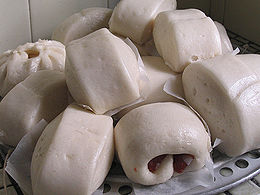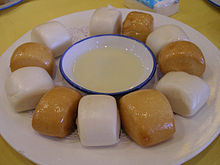- Mantou
-
Mantou 
Classic white mantou Traditional Chinese 饅頭 Simplified Chinese 馒头 Transcriptions Mandarin - Hanyu Pinyin mántóu Min - Hokkien POJ bán-thô or bán-thâu Cantonese (Yue) - Jyutping maan4 tau4 Alternative Chinese name Traditional Chinese 麵頭 Transcriptions Min - Hokkien POJ mī-thâu Mantou, often referred to as Chinese steamed bun/bread, is a kind of steamed bun originating in China. They are typically eaten as a staple in northern parts of China where wheat, rather than rice, is grown. They are made with milled wheat flour, water and leavening agents. In size and texture, they range from 4 cm, soft and fluffy in the most elegant restaurants, to over 15 cm, firm and dense for the working man's lunch. (As white flour, being more heavily processed, was once more expensive, white mantou were somewhat of a luxury in preindustrial China.)
Traditionally, mantou, bing, and wheat noodles were the staple carbohydrates of the northern Chinese diet, analogous to the rice, which forms the mainstay of the southern Chinese diet. They are also known in the south, but are often served as street food or a restaurant dish, rather than as a staple or home cooking. Restaurant mantou are often smaller and more delicate and can be further manipulated, for example, by deep-frying and dipping in sweetened condensed milk.
They are often sold precooked in the frozen section of Asian supermarkets, ready for preparation by steaming or heating in the microwave oven.
A similar food, but with a filling inside, is baozi. In some regions, mainly in Southern China, mantou can be used to indicate both the filled and unfilled buns.
Contents
Etymology
 Deep-fried mantou - a popular Chinese dessert served with sweetened condensed milk
Deep-fried mantou - a popular Chinese dessert served with sweetened condensed milk
A popular story in China relates that the name mantou actually originated from the identically written and pitched, but more heavily pronounced word mántóu meaning "barbarian's head".
This story originates from the Three Kingdoms Period, when the strategist Zhuge Liang led the Shu Army in an invasion of the southern lands (roughly modern-day Yunnan and northern Burma). After subduing the barbarian king Meng Huo, Zhuge Liang led the army back to Shu, but met a swift-flowing river which defied all attempts to cross it. A barbarian lord informed him, in olden days, the barbarians would sacrifice 50 men and throw their heads into the river to appease the river spirit and allow them to cross; Zhuge Liang, however, did not want to cause any more bloodshed, and instead killed the cows and horses the army brought along, and filled their meat into buns shaped roughly like human heads - round with a flat base - to be made and then thrown into the river. After a successful crossing, he named the buns "barbarian's head" (mántóu, 蠻頭, which evolved into the present day 饅頭).
Variations in meaning outside northern China
Prior to the Song Dynasty, the word mantou meant both filled and unfilled buns. The term baozi arose in the Song Dynasty to indicate filled buns only. As a result, mantou gradually came to indicate only unfilled buns in Mandarin and other varieties of Chinese.
In many areas, however, mantou still retains its meaning of filled buns. In the Jiangnan region, it usually means both filled and unfilled buns. In the province of Shanxi (山西) mantou is often called momo (饃饃), which is simply the character for "steamed bun".
The name mantou is cognate to manty and mantı; these are filled dumplings in Turkish, Persian, Central Asian, and Pakistani cuisines. In Japan, manjū (饅頭) usually indicates filled buns, which traditionally contain bean paste or minced meat-vegetable mixture (nikuman 肉まん "meat manjū"). Filled mantou are called siopao in Tagalog. In Korea, mandu (饅頭) can refer to both baozi or jiaozi (餃子). In Mongolia, mantuu are basically the same as the Chinese mantou.
See also
References
Chinese breads Baozi • Bing • Cha siu baau • Cocktail bun • Cong you bing • Cream bun • Ham and egg bun • Hujiao bing • Kompyang • Laobing • Mandarin roll • Mantou • Naan • Sanchuisanda • Sausage bun • Shaobing • Shengjian mantou • Tohax • Xiaolongbao • Youtazi
Categories:- Chinese breads
Wikimedia Foundation. 2010.
